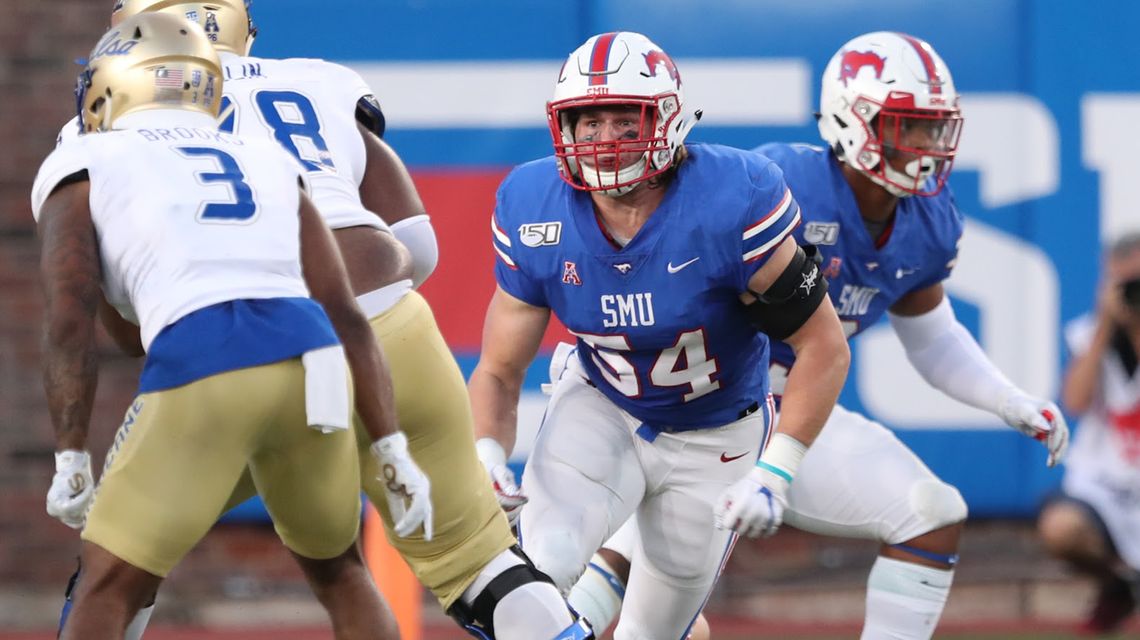
Taken away from football time and time again, a walk-on earned a scholarship where his father starred
SALT LAKE CITY (BVM) — Imagine being told in sixth grade by multiple doctors that you’ll likely never play the sport you love again.
Now imagine proving those doctors wrong, only to have a near-death experience caused by a drug you’ve taken your whole life to remedy your obsessive-compulsive disorder.
Both events were a reality for Southern Methodist University junior Gerrit Choate, but the latter occurred in a University of Utah dorm room, where the Dallas native walked on to the Utes’ football team.
That day began as it usually does for Choate — with his daily dose of Luvox, breakfast and treatment from the Utah training staff — before it became an episode of his darkest memories. As Choate ate his breakfast that morning, he had zero appetite and simply didn’t feel like himself. Choate had begun being slowly weaned off his medication, so the strange feeling in his stomach wasn’t something unusual for him at the time, he said.
With his mother watching helplessly, Choate vomited 24 times in the span of 12 hours. When Choate threw up for the first time that morning, the medication natural to his brain chemistry after years of use came up before it had the chance to digest. It resulted in a seismic reaction Choate had never experienced before.
“Around 11 or 12 o’clock on that day, I just started throwing up nonstop,” Choate said. “The doctors ended up saying it was equivalent to a heroin addict going on a cold turkey detox; the symptoms were similar to that. It was terrible.”
The cause was a prescribed drug, Luvox, that Choate had taken daily for nearly 10 years to help treat his anxiety and OCD.
As early as first grade, Choate said his parents always thought he was an anxious kid. The Dallas native would have irrational fears of his mother dying, for example. As Choate grew older, he said he began exhibiting OCD behavior in the form of hopping on one foot before he left his room or only using his left hand to turn on the sink when washing his hands.
Choate was 10 years old when he was officially diagnosed with OCD and began taking Luvox to help combat it. It wasn’t until about nine years later that a genetic test revealed that the medication Choate relied on for nearly a decade was poisonous for his genetic makeup.
When Choate began experiencing unwanted symptoms, genetic testing determined he needed to come off the medication immediately. He was told it would be incredibly painful for his body, which had become dependent on the drug. Choate could either be admitted to a hospital or have family move to Salt Lake City and help him through the detox. Fifi, Choate’s mother, moved to Utah and into an off-campus apartment to work him through months of getting weaned off the drug.
This technology was not available when Choate was younger, he said, so the SMU defensive lineman has no hard feelings about the events that nearly led to his death. But Choate will forever remember that day in his Utah dorm room with his mother at his side.
“As dramatic as it may sound, I remember laying on the bathroom floor with my mom right next to me and it honestly felt like I was going to die,” Choate said. “I can’t think of any other way to put it besides that. It felt like my body was quitting on me.”
As traumatic as that experience was, it wasn’t the first time Choate said he thought he’d never play the sport he loves again.
During his sixth grade football season, Choate began feeling a sharp pain in his lower back that he originally thought nothing of. He was able to finish the football season, but by the time basketball rolled around, Choate said just about any movement caused excruciating pain.
Choate said he doesn’t remember a particular play where the injury stemmed from, but the result was a stress fracture that turned into a Spondylolisthesis diagnosis – a slipping of the vertebrae at the base of the spine and fracture of the lumbar five vertebrae. For most of Choate’s seventh grade year, he was prohibited from any physical activity and confined to a back brace.
As someone who has played multiple sports his entire life, the immobility led to depression and the exacerbation of his pre-existing OCD and anxiety symptoms.
“It was crushing to be in that situation,” Choate said. “I was told by several doctors that I wasn’t going to be able to play any sport again.”
But there was one doctor, Daniel Sucato, who believed Choate could return to his passion with the right course of action. Choate followed a strict rehabilitation plan for the next year and was cleared for physical activity just before he began eighth grade, an experience he calls the happiest day of his life.
With his back issues in the rearview, Choate went on to become an All-State player at Parish Episcopal High School in Dallas. But even after an impressive prep career, Choate had no Division I offers, not even from the school where his father was a gridiron legend.
Choate’s father, Putt, holds the school record for tackles in a season and career. Growing up, Choate went to SMU games and said he always wanted to follow in his father’s footsteps.
Hurt by the lack of recognition from SMU and other Division I programs, Choate decided to walk on at Utah. Following his freshman season with the Utes and near-death experience, Choate moved back to Dallas in no physical condition to continue playing football.
With the assistance of a nutritionist and local trainer, Choate was able to work himself back into playing shape and began contacting schools to try and find an opportunity. Soon after, Choate found his shot at a place just 15 minutes away from home and where his father built a legacy.
“To be here now playing for his (Putt’s) alma mater is a dream come true,” Choate said. “It didn’t work out in the beginning, but in the end, it’s kind of funny how it all unfolded.”
Although Choate has experienced enough trauma for a lifetime, he’s a football player at the core. It’s why when he wrapped up his high school career, Choate said he was very angry because he felt he was deserving of a Division I scholarship.
People told him that he should take the Division II or Division III route, but Choate said he wanted to take a chance. Choate walked on at SMU as he did at Utah and as he worked to return to peak form following his health scare, he said he had the biggest chip on his shoulder.
Choate was moved from linebacker to defensive end when he arrived at SMU, but takes pride in and has made his mark on special teams. That pride, willingness to adapt and ever-present talent was noticed by the Mustangs’ coaching staff as Choate was promoted to a scholarship player prior to his junior season.
For a young man who has endured horrible circumstances outside of his control, Choate has found peace in the place he always hoped he would be.
“I was so determined to prove everybody wrong,” Choate said. “That day when you’re told you’re being put on scholarship, it all just hits you at once. It was very emotional for me and my family just because of everything that’s happened up to that point.”







